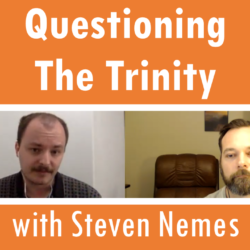Listen to this episode on Spotify or Apple Podcasts
Should Christians celebrate the birth of Christ? If so, where should we draw the line with respect to ancient pagan customs like bringing an evergreen tree into our houses or giving presents to each other? How much pagan practice is too much?
My guest today is philosopher Dale Tuggy, the host of the Trinities podcast and the chair of the board of the Unitarian Christian Alliance. However, in this episode we’re not talking about analytic theology or Christology. Instead we’re discussing Christmas and how Christians should think about it. Tuggy argues that Christians have the freedom to celebrate or not celebrate Christmas.
“Cultural appropriation is the birthright of the human race.”
– Dale Tuggy
“How would the medieval pagans be so powerful that they could just eternally corrupt pine trees or wrapping gifts up in pretty paper and exchanging them or having a feast? They just don’t have that much power. They’re just people like us.”
– Dale Tuggy
—— Links ——
- Follow Dr. Tuggy at his website, Trinities.org
- See Dale Tuggy’s “What John 1 Meant“
- See Dustin Smith’s “The Incarnation of Wisdom in Pre-Christian Judaism“
- Check out the Restitutio podcast on YouTube
- Get the transcript of this episode
- Support Restitutio by donating here
- Join our Restitutio Facebook Group and follow Sean Finnegan on Twitter @RestitutioSF
- Leave a voice message via SpeakPipe with questions or comments and we may play them out on the air
- Intro music: Good Vibes by MBB Attribution-ShareAlike 3.0 Unported (CC BY-SA 3.0) Free Download / Stream: Music promoted by Audio Library.
- Who is Sean Finnegan? Read his bio here








Thank you Sean and Dale. It is so refreshing to hear the voices of logic, reason, and truth. Merry Christmas and Happy New Year to you and yours.
“Cultural appropriation is the birthright of the human race.” – Dale Tuggy
“How would the medieval pagans be so powerful that they could just eternally corrupt pine trees or wrapping gifts up in pretty paper and exchanging them or having a feast? They just don’t have that much power. They’re just people like us.” – Dale Tuggy
This is the philosophy of Rome, “Mystery Babylon,” who intentionally assigned Jesus’ birth to the birthday of the Roman Sun God, Sol Invictus.
It was “cultural appropriation” of the pagans that turned God against His own people, Israel, and drove them into exile in Babylon, because they ignored His commands to shun all pagan practices. Wasn’t the golden calf, a representation of Yahweh, “cultural appropriation”? The Bible speaks approvingly of the kings of Judah, such as Josiah, “who did right in the sight of the Lord” by removing all pagan relics from the land. He even dug up the bones of the pagan priests and burned them to turn away God’s wrath. But it speaks of other kings who “did evil in the sight of the Lord” by allowing the use of pagan relics and mixing the worship of God with pagan practices.
Deuteronomy 12 (NKJV)
1 “These are the statutes and judgments which you shall be careful to observe in the land which the LORD God of your fathers is giving you to possess, all the days that you live on the earth.
2 “You shall utterly destroy all the places where the nations which you shall dispossess served their gods, on the high mountains and on the hills and under every green tree.
3 “And you shall destroy their altars, break their sacred pillars, and burn their wooden images with fire; you shall cut down the carved images of their gods and destroy their names from that place.
4 “You shall not worship the LORD your God with such things. …
29 “When the LORD your God cuts off from before you the nations which you go to dispossess, and you displace them and dwell in their land,
30 “take heed to yourself that you are not ensnared to follow them, after they are destroyed from before you, and that you do not inquire after their gods, saying, `How did these nations serve their gods? I also will do likewise.’
31 “You shall not worship the LORD your God in that way; for every abomination to the LORD which He hates they have done to their gods; for they burn even their sons and daughters in the fire to their gods.
32 “Whatever I command you, be careful to observe it; you shall not add to it nor take away from it.
God’s attitude towards “cultural appropriation” of paganism is no different in the New Testament.
1 Cor. 10 (NKJV)
14 Therefore, my beloved, flee from idolatry.
15 I speak as to wise men; judge for yourselves what I say.
16 The cup of blessing which we bless, is it not the communion of the blood of Christ? The bread which we break, is it not the communion of the body of Christ?
17 For we, though many, are one bread and one body; for we all partake of that one bread.
18 Observe Israel after the flesh: Are not those who eat of the sacrifices partakers of the altar?
19 What am I saying then? That an idol is anything, or what is offered to idols is anything?
20 Rather, that the things which the Gentiles sacrifice they sacrifice to demons and not to God, and I do not want you to have fellowship with demons.
21 You cannot drink the cup of the Lord and the cup of demons; you cannot partake of the Lord’s table and of the table of demons.
22 Or do we provoke the Lord to jealousy? Are we stronger than He?
23 All things are lawful for me, but not all things are helpful; all things are lawful for me, but not all things edify.
When did human philosophy displace the command to “flee from idolatry?” Instead of allowing human philosophy and judgment to justify what we want to do, isn’t the better approach to ascertain God’s perspective from his consistent dealings with His people, to see what He approves and disapproves, and adjust our desires to confirm to what pleases Him? It seems to me this whole question comes down to who we want to please, ourselves and the desires of family and friends, or God.
Well stated Tim. I am disappointed by these Dale and Sean lack of biblical reference for topics and how they are just mulling over doctrine. People do not need philosophy, people need answers directly from the Scrioptures. Here is God’s answer specifically about this topic…..
Jeremiah 10:2-5
2 Thus saith the LORD, Learn not the way of the heathen, and be not dismayed at the signs of heaven; for the heathen are dismayed at them.
3 For the customs of the people are vain: for one cutteth a tree out of the forest, the work of the hands of the workman, with the axe.
4 They deck it with silver and with gold; they fasten it with nails and with hammers, that it move not.
5 They are upright as the palm tree, but speak not: they must needs be borne, because they cannot go. Be not afraid of them; for they cannot do evil, neither also is it in them to do good.
One thing I used to struggle with (perhaps still do) is I thought there was an instance in the bible where I think it was while Moses was up in the mountain the people decided to make golden calf but argued they were still worhsipping God as it says in verse 5 “When Aaron saw this, he built an altar in front of the calf and announced, “Tomorrow there will be a festival to the Lord.”, to which God’s response was rejection of that worship, as it was not in accordance with what He has prescribed. I don’t really understand the word “Lord” here, were they saying the calf was their lord or were they claiming they were worshipping the real Lord by worshipping this calf. Regardless, they appeared to be claiming to worship in ways HE had not instituted. I was concerned that this whole episode meant, as people, we can convince ourselves that what we are doing is for the glory of God, but we can be kidding ourselves, lying even, and offending God, if we come to Him in ways that He did not decree as acceptable. He will not accept it, in fact be angered by it as in verse 10 it says “Now leave me alone so that my anger…” So many of the traditions of Christmas seem to be about treating ourselves. Eating, drinking, presents, catching up with friends and family, talking. While we are doing these things, do we really think about Him much. How can we. Is not a more real worship, God centred in what we do. Praying, praising, singing psalms, being thankful. Those actions. What has huge socialising really to do with remembering what God has done for us in Jesus. If we do these things in love than perhaps in a round about way we are spreading love and goodwill, but I hope whatever we do, it is what God finds acceptable, true recognition of Him and not that we just wanted to keep doing the things that feel nice for us, and argue that it is for the glory of God when in truth, it’s more about us. I try to take various times out during the day to think about what happened for us, but I’m not sure a lot of people make that opportunity, especially if they are the preparer’s of large family meals.
Thank you, Sean and Dale, for taking the time to construct this episode. There were many comments I appreciated and that presented challenges to my current mindset against the observation of christmas. (I should disclose that I was raised with this belief and have fully investigated the topic as an adult.) For some reason, Dale’s basic statement (that dead pagans do not have the power to corrupt behavior across millennia) challenged me to consider the scenario differently than in the past. I remain in search of my own understanding.
However, I’d like to ask you both a question. This morning, I just completed listening to Mark Cain’s interview with Heather Bonsall from 9/13/23 on the UCA podcast (“Reiki, New Age Mysticism, and the Purge”). (My husband will not mind my disclosing that he also came out of New Age practices to Christianity and Unitarianism prior to our meeting, so I have special interest in the subject.) There was a segment in the podcast where MC asked HB about whether she believes Christians today may be involved in mysticism but not understand that they are (53:30), and he asked for an example. She immediately responded, “Yoga.” Mark, then, suggested the same idea presented in this podcast: A behavior or an action reflects the mind and intent of the person performing it (e.g., decorating a christmas tree), and if the person isn’t performing idol worship, then that’s not what the act represents. HB pushed back against this, citing that the specific poses in Yoga are actually worship poses in Hindu; they aren’t created simply to stretch the body in amazing ways. It was postulated that practicing yoga (even without understanding its roots) potentially opens the door in the Christian’s spiritual life to demonic spirits, as if this participation is a signal, of sorts, to the spirit world: “Hey, I’m available…” (or, at minimum, is an offense to Yahweh).
I’d like to ask whether both Sean and Dale agree with this perspective about yoga? It seems to me that, in accordance with the thoughts presented here, you’d have to disagree that the practice of yoga as exercise is a problem for the Christian (in order to be consistent). If you do agree with the conclusion that yoga as “exercise” is inappropriate for the Christian, could you help me understand what is different about this practice of yoga and the observation of christmas? I find many christians who believe that one is ok (christmas), but the other is not (yoga).
I apologize about asking about information from a different podcast, but I am really trying to think through these situations. (Also, I do not do yoga; I don’t really have a “dog in the hunt” there. It just seems completely equivalent as an example.)
Thank you very much the efforts of you both. Your work enriches my life immensely. Regards, C